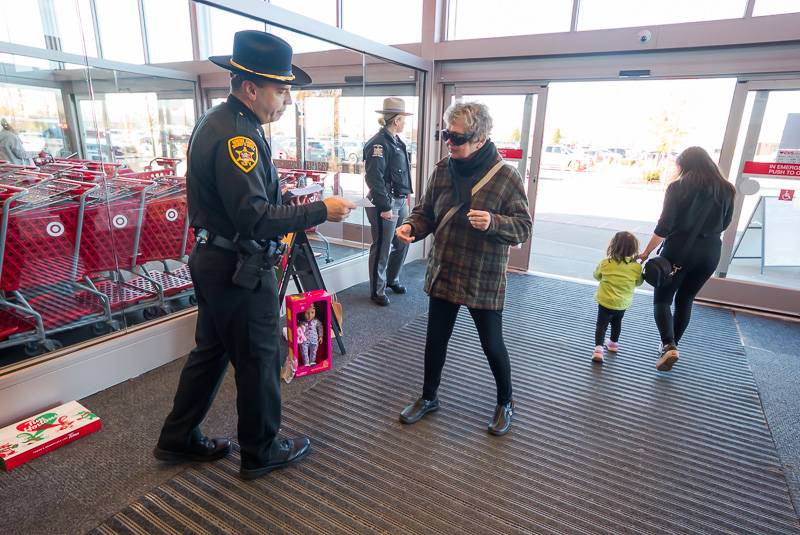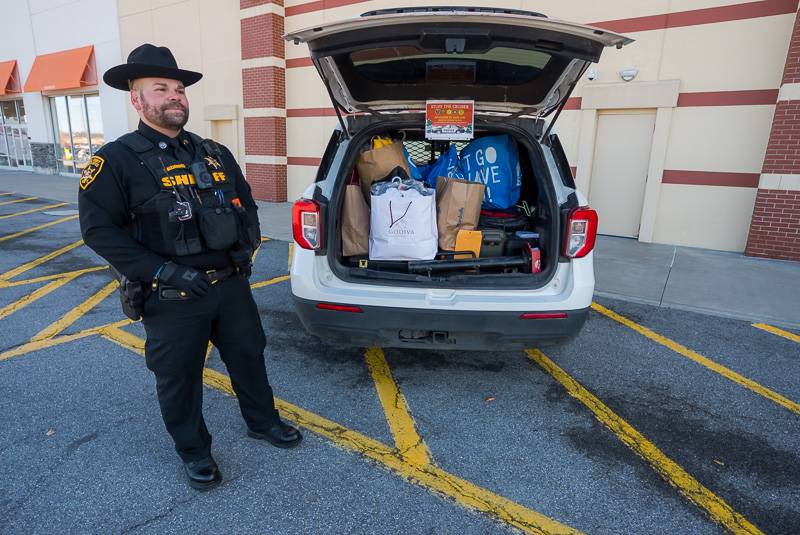Was the Genesee County Economic Development Center Board of Directors' decision to provide $1.7 million in tax abatements to COR Development legal?
That depends on who you ask.
A Buffalo assemblyman thinks the GCEDC board violated provisions of the 2013-14 budget act, which attempts to curtail state sales tax abatments for retail projects.
Assemblyman Sean Ryan is asking for an investigation by the state's tax commissioner, but when The Batavian contacted Taxation and Finance Department last week, it took awhile to get a response and when we did, the agency passed the buck to the state's Budget Office.
So far, no state agency has expressed much interest in taking a closer look at GCEDC's actions.
At issue is a resolution passed by the GCEDC board that found COR's proposal to redevelop the former Lowe's location in Batavia Towne Center meets the necessary legal requirements to receive state aid.
Specifically, under terms of the law, an IDA cannot provide relief on state sales tax without making certain findings. Among the possible findings are that the project will serve as a tourist destination or that it's in a highly distressed area.
The finding for the COR project by the GCEDC board was that the project provides goods and services that are not readily available to local residents from current retail stores.
At the time the board passed the resolution, the only publicly announced tenant for COR's project was Dick's Sporting Goods.
Last week, at a Town of Batavia Planning Board meeting, it came out that Kohl's is a likely tenant.
There may be at least one other, and possibly a fourth, tenant, but there's no reliable indication of who those tenants might be.
Today, GCEDC Chairman Charlie Cook said at the time of the vote, the board had been given two other names, but acknowledged negotiations were still under way between the retailers and COR at the time of the vote. There is no guarantee that those retailers will be the ones to eventually occupy the space.
The big question is whether Dick's meets the requirement under the law for providing goods and services not readily available in the local market.
Ryan has pointed out -- as most Genesee County residents know -- there are four sporting goods stores in Batavia. There are also three department stores that sell sporting goods.
Cook said he's not much of a sporting goods shopper and is largely unaware of the type of merchandise carried by Dick's or what local retailers might offer that is similar or different.
"I feel the input that I had from the people in the community was that having Dick's here would be a huge draw for the surrounding area, and I guess that's something people will always have a differing opinion about," Cook said.
Prior to approving the COR abatements, the GCEDC conducted a public hearing on the project, as required by law.
COR VP Joseph B. Gerardi made a presentation about the project at the hearing, but no GCEDC staff covered the agency's position on the project.
The pending resolution, with its key finding about the uniqueness of the project, was not made available by GCEDC staff at the meeting or prior to the vote by the board the following Thursday.
In other words, the public had no opportunity to review specifically what the board would vote on and comment on it.
State law enacted in 2012 requires "to the extent practicable" that resolutions to be voted on be made available to the public prior to the meeting.
We requested an interview with GCEDC CEO Steve Hyde this afternoon, but he was tied up in meetings and unavailable.
After the May 2 vote approving package of incentives, The Batavian began making inquiries trying to find out who, if anyone, would enforce the IDA law if there was any question about its application for a retail project.
We found press offices with state agencies willing to provide information "on background," but nobody willing to provide on-the-record information about the law and how it's enforced, if at all.
One exception was the Comptroller's Office, where spokesman Bruce Butry was willing to be as helpful as he could be.
The Comptroller's Office could conceivably audit the GCEDC and even focus on this specific project, but an audit would merely result in a written report, leaving it up to the County Legislature to act, or not, on any findings.
"At the end of the day, it's up to the people in the local community," Butry said. "Some of these IDAs operate with very little accountability other than the pressure put on the boards by the public regarding the types of projects they're going to approve."
The Governor's Office had no on-the-record comment about the law or the local situation.
Butry suggested we try Taxation and Finance. Once we reached the right person, he was very friendly, but he said it was up to the state's Budget Office to answer any questions about the law.
In response to a long list of e-mailed questions, Morris Peters, spokesman for New York State Division of Budget, provided some information "on background," and this statement for publication:
“Under these reforms, grocery stores will no longer be given tax breaks to move across the street. Tax dollars will be focused on those industries that create jobs and companies who will move to New York to help build our economy.”
Assemblyman Steve Hawley, who represents Genesee County, isn't surprised that Albany is keeping this issue at arm's length. He believes the decisions to provide abatements is a local issue and should be considered beyond interference from state agencies.
"I try not to meddle in local decision-making because there are too many people who do, like Mr. Ryan," Hawley said.
In response to Ryan's making public statements about the COR abatements, Hawley and Sen. Mike Ranzenhofer, who also represents Genesee County, were trying to organize a press conference for tomorrow to highlight the successes of GCEDC and invite Ryan to take a closer look at the agency, with an eye toward how he might better help his own constituents in the City of Buffalo achieve greater economic prosperity.
Scheduling conflicts may prevent that press conference from taking place.
Earlier today, Ryan and Hawley had a brief phone conversation in which Hawley said he asked Ryan, "Have you moved to Genesee County?"
When Ryan returned a call to The Batavian, he said, "I understand some people there are upset with me."
But Ryan said it was legitimate for him to call into question the GCEDC giveaway of state tax money because it affects his constituents, too, as it does all taxpayers in the State of New York.
"It all goes back to this: whose tax dollars are they handing out?" Ryan said. "Those tax dollars belong to every taxpayer in the State of New York."
A cynic might think that Ryan's real motive is to keep Dick's Sporting Goods out of Batavia so that Genesee County residents continue to drive to Erie County to shop.
Ryan said, "You could say that, but you should say he wants high wage jobs so that people can raise families and that we should use our scarce revenue to bring in those high wage jobs, not low-paying retail jobs that require people to draw on Medicare and food stamps because the wages are so low. That's not good for our economy and that's not good economic development."
To Ryan's point, the Comptroller's Office has a long history of taking a critical look at IDAs, even before Thomas DiNapoli held the office, particularly in the area of tax abatements for retail projects.
The current law attempting to curtail tax breaks for retail projects is based on a similar law that the state Legislature allowed to expire in 2008.
In 2006, the Comptroller's Office issued a report looking at implementation of the law and found that IDAs found creative ways to skirt it.
(The) exceptions, all of which are applied at the discretion of local IDA boards, can make the retail prohibition ineffective.
Since the application of these exceptions is determined at the discretion of each IDA, these criteria are sometimes subject to expansive interpretations.
The examples given were out of Erie County and included "tourism destination" designation for projects because they were located near an airport or Thruway exit.
Last week, the office again issued a report on IDAs and included a discussion of why it's important to curtail tax breaks for retail projects.
Retail projects generally do not increase the level of jobs available in a region or economic activity, as project-related gains often come at the expense of other retail enterprises in the area, and the jobs associated with retail trade tend to pay significantly less than manufacturing or other professional jobs. The restriction on retail projects was reinstated in the 2013-14 State Fiscal Year Budget, indicating that State policymakers understand the limited usefulness of these projects for economic development.
And ...
Very few of the IDAs sponsoring retail projects reported the estimated salaries of the jobs to be created, but data from the New York State Department of Labor shows that the average starting salary for a retail salesperson is $17,250, while the average for first line retail supervisors is $28,720.
IDAs, Ryan said, have become "subsidy machines."
"COR gets these subsidies from Buffalo to Syracuse," Ryan said. "They've figured it out. They know they can come to these IDAs and have their project viewed favorably because they say, 'see what a great thing we're doing for the community,' and everybody can say they're a part of it. The politicians run for election and stand in front of the place and say, 'look at what we brought here.' "
Ryan doesn't even believe it's about the commission check GCEDC will get for the project, which could total $100,000. It's about looking good, he said.
Even if Ryan is successful -- and Hawley doubts anybody in Albany will take serious an out-of-district assembly member calling for an investigation -- in getting the tax commissioner to look at the project, it's unclear from the IDA law what power, if any, the commissioner has to overturn a local decision.
Here's the relevant section of the law:
The commissioner is hereby authorized to audit the records, actions, and proceedings of an IDA and of its agents and project operators to ensure that the IDA and its agents and project operators comply with all the requirements of this section. Any information the commissioner finds in the course of such audit may be used by the commissioner to assess and determine state and local taxes of the IDA's agent or project operator.
And even if the commissioner can recapture the tax revenue, Butry, from the Comptroller's Office, said it only applies to the state sales tax incentive.
COR received a tax break on state and local sales tax for the purchase of building material, as well as a revised PILOT (Payment in Lieu of Taxes) on the increased assessment and mortgage tax relief.
Ryan agrees that there is no provision in the law for anybody in Albany to overturn the PILOT, the local sales tax or mortgage tax abatement. Those are entirely local decisions.
At the public hearing, Gerardi said the local share of sales tax revenue from the project would be $1 million.
Using that as a base for calculation, that puts projected annual gross revenue at build out at about $26 million.
Gerardi said the retailers coming into the project would invest $11 million.
Those don't sound like numbers, Ryan said, of companies that need tax incentives to build retail projects and create a playing field that isn't level for existing retailers.
Charlie Cook said he truly believes that in a small market like Batavia, big retailers won't come here without a reduction in their operating costs.
"You hate to see that big empty building just sitting there," Cook said. "They are offering an opportuinty to fill it with something that is vibrant and exciting and has the potential to draw in outside people."
Mike Barrett of Batavia Marine and Kurt Fisher of Fisher Sports have said they believe they can compete with Dick's on quality and service and Cook said he is hoping that is true.
"As you pointed out, these businesses have proven to be resilient and able to find niches and services that continue to make them very successful," Cook said. "That's my hope, that everyone is going to be a winner in the long run."
Cook said he and the GCEDC board are just trying to do the best they can for the community and there's no intent to subvert the law.
"We're a board of volunteers and the one thing we're interested in is promoting business development in Genesee County," Cook said. "That's our only motivation to sit on the board and when those opportunities come up, we embrace them."
As to any legal concerns raised by Ryan, Cook said that GCEDC has asked its attorneys to review Ryan's assertions, but Cook also said that prior to the board's vote, legal counsel assured the board that the action it was about to take was legal and proper.
"We're not out to push anything through that is improper," Cook said. All the information we had said it was perfectly proper and I guess at this point, we'll defend that. If it turns out that it wasn't, we'll review our policies and not do that anymore."








